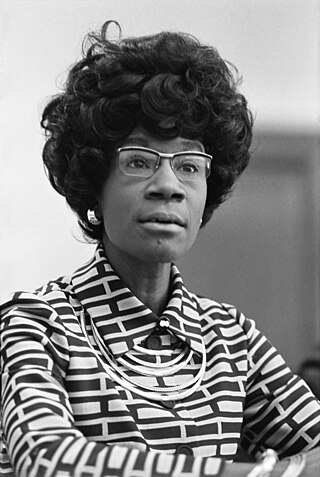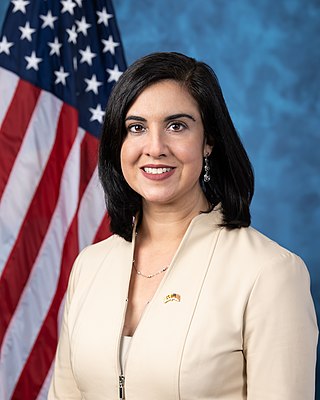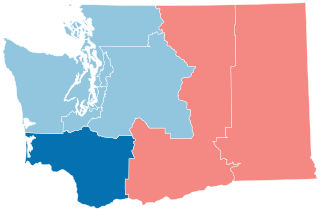The Green Party of the United States (GPUS) is a federation of Green state political parties in the United States. The party promotes green politics, specifically environmentalism; nonviolence; social justice; participatory democracy; grassroots democracy; anti-war; anti-racism; eco-socialism. On the political spectrum, the party is generally seen as left-wing. As of 2023, it is the fourth-largest political party in the United States by voter registration, behind the Libertarian Party.

The Peace and Freedom Party (PFP) is a left-wing political party with ballot status in California. Its first candidates appeared on the 1966 New York ballot. The Peace and Freedom Party of California was organized in early 1967, gathering over 103,000 registrants which qualified its ballot status in January 1968 under the California Secretary of State Report of Registration.

Gloria Marie Steinem is an American journalist and social-political activist who emerged as a nationally recognized leader of second-wave feminism in the United States in the late 1960s and early 1970s.
The Log Cabin Republicans (LCR) is an organization affiliated with the Republican Party which advocates for equal rights for LGBT+ Americans, by educating the LGBT+ community and Republicans about each other.

Shirley Anita Chisholm was an American politician who, in 1968, became the first black woman to be elected to the United States Congress. Chisholm represented New York's 12th congressional district, a district centered on Bedford–Stuyvesant, for seven terms from 1969 to 1983. In 1972, she became the first black candidate for a major-party nomination for President of the United States and the first woman to run for the Democratic Party's presidential nomination. Throughout her career, she was known for taking "a resolute stand against economic, social, and political injustices," as well as being a strong supporter of black civil rights and women's rights.

Norvell Kay Granger is an American Republican politician from the U.S. state of Texas serving as the U.S. representative for Texas's 12th congressional district since 1997. She became chair of the United States House Committee on Appropriations in 2023.

The 1972 Democratic National Convention was the presidential nominating convention of the Democratic Party for the 1972 presidential election. It was held at Miami Beach Convention Center in Miami Beach, Florida, also the host city of the Republican National Convention that year, on July 10–13 1972. Lawrence F. O'Brien served as permanent chairman of the convention, while Yvonne Braithwaite Burke served as vice-chair, becoming the first African American and the first woman of color to hold that position. On the last day of the convention, Lawrence F. O'Brien departed and Burke was left to preside for about fourteen hours.

LGBTQ+ Victory Fund, commonly shortened to Victory Fund, is an American political action committee dedicated to increasing the number of out LGBTQ+ public officials in the United States. Victory Fund is the largest LGBTQ+ political action committee in the United States and one of the nation's largest non-connected PACs.

David Wayne Loebsack is an American politician who served as the U.S. representative for Iowa's 2nd congressional district from 2007 to 2021. A member of the Democratic Party, he also is an emeritus professor of political science at Cornell College, where he had taught since 1982. On April 12, 2019, Loebsack announced he would not seek reelection.

Mildred McWilliams "Millie" Jeffrey was an American political and social activist during the labor reforms, women's rights, and civil rights movement.

Nicole Malliotakis is an American politician serving as the U.S. representative for New York's 11th congressional district since 2021. Her constituency covers Staten Island and southern Brooklyn.
The Feminist Majority Foundation (FMF) is a non-profit organization headquartered in Arlington County, Virginia, whose stated mission is to advance non-violence and women's power, equality, and economic development. The name Feminist Majority comes from a 1986 Newsweek/Gallup public opinion poll in which 56 percent of American women self-identified as feminists. President and one of the founders, Eleanor Smeal, chose the name to reflect the results of the poll, implying that the majority of women are feminists.

The Democratic Socialists of America (DSA) is a multi-tendency, democratic socialist political organization in the United States. After the Socialist Party of America (SPA) transformed into Social Democrats USA, Michael Harrington formed the Democratic Socialist Organizing Committee (DSOC). The DSOC later merged with the New American Movement to form the DSA. The organization is headquartered in New York City and has about 80,000 members. It leads organizing and protest campaigns, and has members in the House of Representatives, state legislatures, and other local offices.

LGBTQ+ conservatism in the United States is a social and political ideology within the LGBTQ+ community that largely aligns with the American conservative movement. LGBTQ+ conservatism is generally more moderate on social issues than social conservatism, instead emphasizing values associated with fiscal conservatism, libertarian conservatism, and neoconservatism.

This article lists those who were potential candidates for the Democratic nomination for Vice President of the United States in the 1972 election. Coming into the 1972 Democratic National Convention, South Dakota Senator George McGovern had the delegate lead, but did not have the presidential nomination locked up. After winning the Democratic nomination for president on July 13, McGovern looked for a running mate. McGovern's first choice for vice president was Ted Kennedy, but Kennedy refused to join the ticket; Minnesota Senator Walter Mondale, Wisconsin Senator Gaylord Nelson, and Connecticut Senator Abraham A. Ribicoff also declined. McGovern offered the position to Missouri Senator Thomas Eagleton, who appealed to labor groups and Catholics, two groups that McGovern had alienated during the primary campaign. The ticket of McGovern and Eagleton was nominated by the 1972 Democratic National Convention. Following the convention, it was revealed that Eagleton had received treatment for depression in the 1960s. Though McGovern considered keeping Eagleton on the ticket, he ultimately chose to replace Eagleton with former ambassador Sargent Shriver. The McGovern–Shriver ticket lost the presidential election to the Nixon–Agnew ticket. After the controversy surrounding Eagleton, future campaigns spent much more time vetting vice presidential candidates.
Tanya Melich is one of the founders of the modern women's political movement. She was born in Moab, Utah on April 23, 1936 and co-founded the National Women's Political Caucus and was an early leader of the National Women's Education Fund, which focused on educating women in gaining political power. Melich attended every Republican National Convention from 1952 through 1996 except 1984. Melich served on the staffs of Nelson Rockefeller, Jacob Javits, Charles Goodell, and John Lindsay. In 1998, she left the Republican Party over women's issues. She coined the phrase, "Republican war against women." She now considers herself a Jeffords independent in the mold of the former U.S. Senator from Vermont.

Jill Elizabeth Ruckelshaus is a former special White House assistant and head of the White House Office of Women's Programs and a feminist activist. She also served as a commissioner for the United States Commission on Civil Rights in the early 1980s. Currently, she is a director for the Costco Wholesale Corporation.

The 2022 United States House of Representatives elections in Kentucky were held on November 8, 2022, to elect the six U.S. representatives from the state of Kentucky, one from each of the state's six congressional districts. The elections coincided with other elections to the House of Representatives, elections to the United States Senate and various state and local elections.

The 2022 United States House of Representatives elections in Washington were held on November 8, 2022, to elect the 10 U.S. representatives from the state of Washington, one from each of the state's 10 congressional districts. The elections coincided with other elections to the House of Representatives, elections to the United States Senate and various state and local elections. Going into this election, the Democratic Party represented seven seats, while the Republican Party represented three seats.

The National Advisory Committee for Women (NACW) was a presidential commission established by President Jimmy Carter in 1978. It was renamed the President's Advisory Committee for Women (PACFW), with a reduced mandate, in 1979.

















